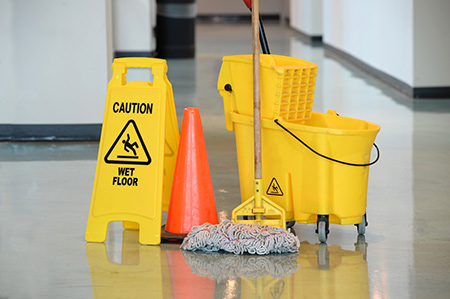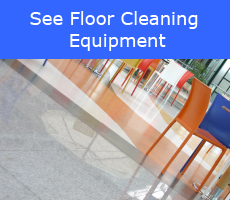Commercial Floor Cleaning Equipment
How to Choose
What type of floor cleaning machine do you really need?
We specialise in commercial cleaning equipment and supply a wide range of floor cleaning machines across the UK. We’re happy to offer advice, but even we find it difficult at times to know what to recommend, as there are so many types of floor cleaning equipment available, from floor sweepers to floor buffers and polishers, vacuum cleaners and of course scrubber dryers. The more we know about the environment and type of dirt to be cleaned, the better.
Firstly lets look at the different types of equipment typically used for cleaning floors, then we’ll follow up with some things to think about to help you to choose the right machine.
Types of floor cleaning machines
We’re starting with the assumption that you’re not looking for a mop and bucket, although they do have their place of course!

Floor sweepers
At the basic level, floor sweepers are an alternative to manual sweeping with a broom. These range from small battery powered models to industrial sweepers with dust extraction capabilities. Floor sweepers use rotating brushes to effectively sweep the dirt from the floor and deposit it into a hopper for emptying at a later date. Different brush types are available for various types of dirt (for example, finer dirt will require a softer brush for better results). Ride-on sweepers are ideal for factory cleaning as they cover a lot of ground quickly and have large hoppers to reduce time spent emptying the waste.
To find out more, read our floor sweeper glossary.
Floor scrubbers and scrubber dryers
Today’s floor scrubbers are very sophisticated cleaning machines. Many will scrub and dry floors, some also sweep the floor at the same time as scrubbing it. Industrial floor scrubbers use brushes to agitate cleaning solution into the floor to remove the dirt, the resulting residue being collected by a system of squeegees at the rear of the machine. The residue is then vacuumed into a collection tank for later disposal. The floor should be left both clean and dry which means the minimum of disruption to the business.
There is a wide range available, from small upright machines, to pedestrian floor scrubbers with high pressure and suction capability, to ride-on scrubber driers, many of which qualify for tax relief under the ECA scheme.
To find out more, read our scrubber dryer glossary.
Floor buffers and polishers
Ideal for use on hard floors in schools, shops, warehouses and hospitals, floor buffers are versatile floor cleaning machines capable of dislodging dirt and dust, and also polishing the floor. Ideal for a wide range of floor types including wood, marble, stone or lino, some heavy duty machines can also scarify concrete floors. The machine brushes can be changed for best results when cleaning or polishing. Floor burnishers are also available, working at high speeds to give a long lasting shine.
Vacuum cleaners
Usually the first choice to remove dirt from carpeted floors, commercial vacuum cleaners come in all shapes and sizes, with many suitable for a range of floor types. Some models can also double up as hard surface floor cleaners, with the ability to remove any wet patches or stubborn dirt.
For deep cleaning of carpeted areas, extraction cleaners are also available.
“Wet & Dry” vacuums can be used on wet or dry surfaces and many have large capacity containers, with high suction capability.
Some tips on how to choose the right type of equipment for your needs
- Think about what types of surface (or surfaces) are to be cleaned. If there are different surfaces (e.g. carpeted floors and tiled floors) you may need different machines, although there are many multi-purpose floor cleaners available too.
- The physical size of the cleaning area determines the size of machine needed. The cleaning width of the floor sweeper or scrubber dyer will give an indication of how much cleaning can be done, and generally speaking the higher the power, the longer you can use it for, so the more area you can cover. Most machines give a floor area performance indication in their technical details to show the area that can be cleaned in an hour.
- Access to a power source is important – if you need to clean larger areas, even the longest cables might not reach, and of course there’s always a trip hazard and sometimes difficulties manoeuvring around a trailing lead. Battery powered floor cleaning machines are becoming more sophisticated (and powerful) all the time and many are designed to be eco-friendly.
- What types of dirt and debris typically end up on the floor? Light dust for example might only need vacuuming or sweeping. Oily or hard to remove dirt and grime will require a heavier duty machine, and that’s usually where the scrubber dryer comes into play.
- Do you need daily cleaning, with the ability to mop up spills quickly? You might find that a small scrubber dryer will suit you. Do you need a serious deep clean from time to time? You might want to buy a machine for daily use, then consider hiring for your periodic scrubbing and sanitising.
- Who’s going to be using the floor cleaning equipment? Many of the machines we supply are ergonomically designed and easy to use, so anyone should be able to use them without any guidance. Some of the larger more sophisticated machines though, will require operator training to make sure they’re used to full advantage and are maintained properly for longer life. It’s also important that all operators know how to use them safely.
- What is the environment like? An industrial floor cleaning machine is often used in an environment where it can be subject to knocks and bangs, so make sure you use one that’s robust enough for your workplace. Scrubber-sweepers are now available, like the Factory Cat Minimag, or the Mac SD1000R, both designed for large areas and factory floors.
- Will the cleaning be done when there are people around? Safety and noise are the main considerations here as, whilst your operators can use ear defenders, members of the public (in a shopping centre for example) or co-workers probably can’t, so you need to be careful not to exceed safe limits (as defined under the Control of Noise at Work Regulations 2005).
Whilst this isn’t an exhaustive list, it helps us to make a start when advising customers on the type of machine they need. In our floor cleaning equipment category we provide details of some of the most popular machines available with specifications and suggestions about their suitability.
We understand that buying floor cleaning equipment is an important investment, so if in doubt, give us a call!
We’re always happy to help and you can rely on us to give professional advice and guidance. We can often arrange demos and also have a range of floor cleaning machines available to hire, so you can try before you buy.


